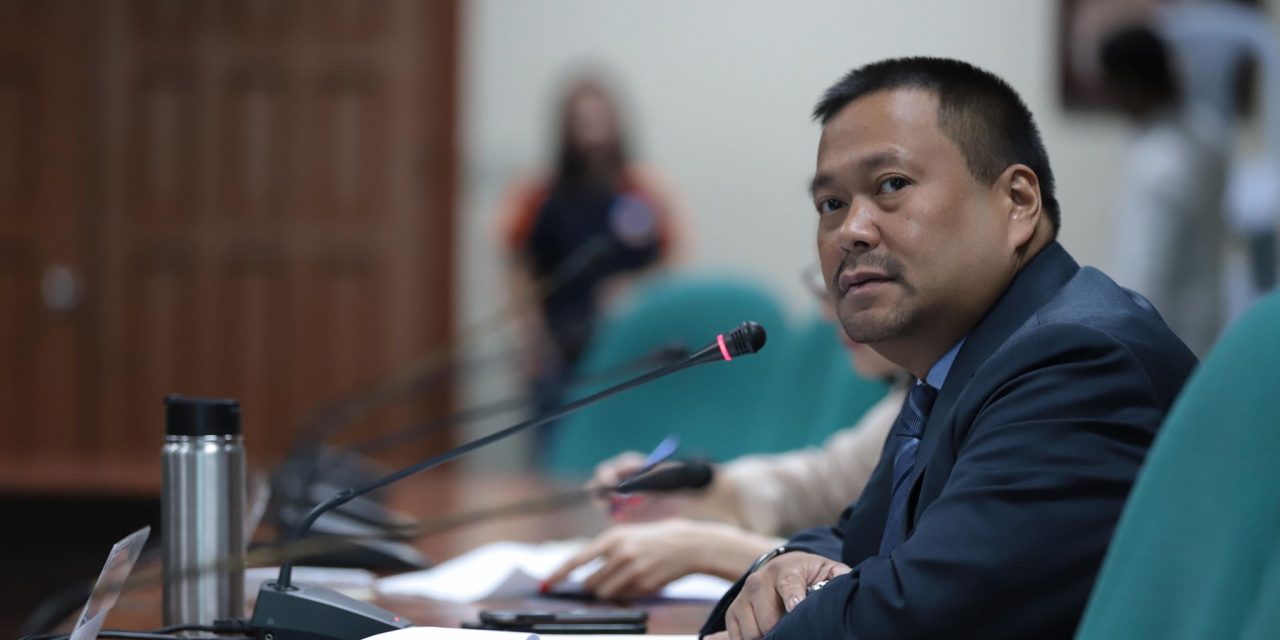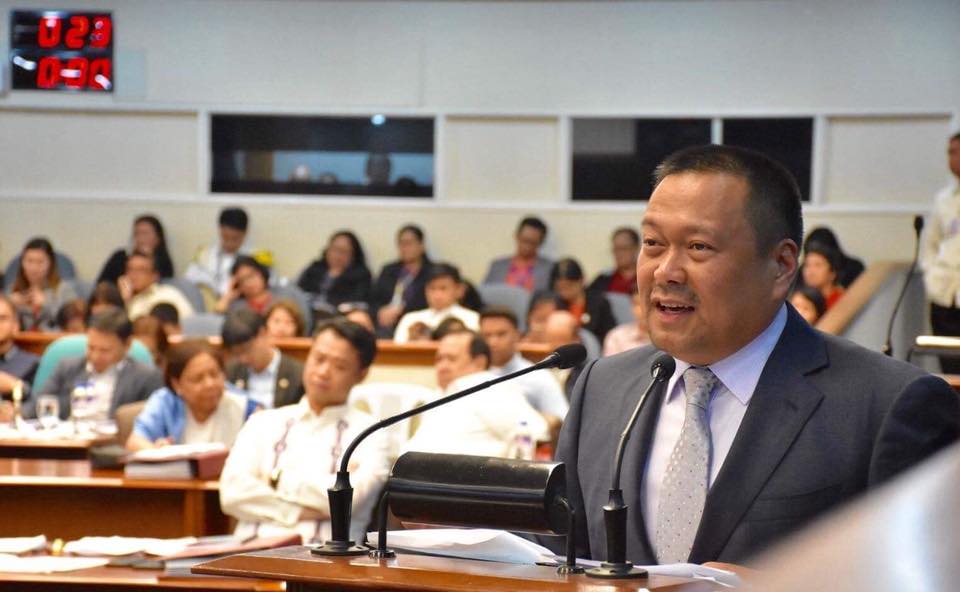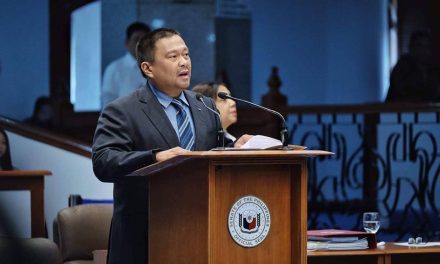Mr. President, honorable colleagues, good afternoon.
Today, it is my privilege to sponsor Senate Bill No. 1850 under Committee Report No. 390 entitled “An Act Institutionalizing a National Integrated Cancer Control Program and Appropriating Funds Therefor”.
Mr. President, 30 years ago, kapag sinabi ng doktor na ang isa sa inyong mahal sa buhay ay may cancer, para na rin nitong itinakda ang araw ng kanyang kamatayan, isang death sentence na maituturing. Kakauti lamang noon ang may alam kung ano ba ang kanser at saan ito nakukuha. Walang available na gamot o treatment para mapagaling ang isang pasyente na may kanser. Kahit ang gobyerno noon ay walang programa para mapigilan ang paglaganap ng kanser.
Sa ngayon, trahedya pa ring maituturing ang pagkakaroon ng cancer ng isang mahal sa buhay. Maliban sa pisikal na karamdaman ng pasyente, sama-samang dumaranas ng emosyonal na sakit ang buong pamilya. Hindi rin maitatanggi na dumaragdag at sumasabay pa sa kalungkutan ng pasyente ang pinansyal na suliranin na kaakibat ng pagkakasakit.
In the Philippines, Cancer is the third leading cause of adult death and fourth in child mortality. The Philippine Cancer Facts and Estimates from the Department of Health reveal an alarming increase in the incidence of cancer estimating up to 8 deaths per day for childhood cancer and up to 11 new cases and 7 deaths every hour for adult cancer. This computes to a figure of approximately 110,000 new cancer cases and over 66,000 cancer deaths each year.
The most recent study of the International Agency for Research on Cancer (IARC) attributes the high mortality ratio among poorer and marginalized populations mainly to the weak health systems, limited access to quality cancer care and partly to the late diagnoses of common cancers.
Undoubtedly, cancer has become a global health threat and incidence rates are rising. The study estimates that in 2012 more than 6.7 million people developed the disease and that this will rise by almost 60% translating to over 10.8 million people will be diagnosed with cancer in the next 14 years.
These data do not account for countless unreported cases most of which, we can surmise, are in the poorest segment of the population who are sadly trapped in a situation where even basic assistance is not accessible.
Cancer is a heartbreaking crisis. The facts are overwhelming. Yet cancer has been ignored — until now. After decades of countless bills filed, it is with great honor that I hereby sponsor the enactment of a legislation that is envisioned to institutionalize a holistic and integrated cancer control program for all Filipino citizens.
This legislative initiative has earned the endorsement of the majority of our honorable colleagues in the Senate who have responded with compassion to the just clamor of multi-sectoral stakeholders representing the whole spectrum of Philippine society. This advocacy has galvanized a rare alliance of cancer patient groups, health care providers, cancer advocates and champions engaging and working with government, policy makers, private sector, civil society, and international development partners in developing the comprehensive provisions needed to address the complex challenges of cancer care.
The bill seeks to address the various gaps in the cancer care continuum and integrated solutions for every single step: from prevention, detection, correct diagnosis, treatment and palliative care, pain management and survivorship or end of life.
Our vision is a patient centric support system that is caring, supportive, within a progressive and enabling environment so that Filipinos affected with cancer can live with dignity, enjoying long, productive, and meaningful lives.
Sa panahon ng social media, madami tayong nakikita at nababasa sa facebook o twitter na mga istorya tungkol sa kanilang laban sa cancer. Stories that will inspire us to act and help prevent the occurrence of catastrophic diseases. —
A newlywed was diagnosed with Stage 3 Breast Cancer. She underwent various treatment for cancer: mastectomy; chemotherapy; radiation and long term of hormonal therapy. She even lost an ovary because of cancer treatments. Despite this, she still got pregnant. Allow me to quote her: “With a single breast, a single ovary and the odds stacked heavily against me, twin miracles arrived safely in my arms. Today I have 7-year old boys by my side. They are living proof that miracles can and do happen every day.”
During our Committee Hearing for this measure, one of our resource persons is Mr. Seve Perez. He is a 15-year old cancer survivor who was diagnosed with acute lymphoblastic leukemia, an aggressive form of blood cancer. Let me share with you his story by quoting him: “When I was three years old, I went through two and half years of grueling cancer treatment. I thought all children lived like me. But then I realized I was different. I was losing my hair, instead of growing it. I spent more time in hospital beds than my own bed; more time in the laboratory room for blood extractions than my classroom, a thousand injections, many scans and transfusions, always wearing a mask, and limited time for play. After 30 months of treatment, I almost didn’t make it.”
“My parents always told me to be strong and I obeyed. Looking back, I suspect they were talking to themselves because they were afraid I would lose my battle. My parents gave up food, sleep, time at work and time with my other siblings. They had to borrow money. It was a very hard time for our family. This is a nightmare you don’t wish on anyone, including your enemies.”
“I thought my story was rare. But these days, I meet more children, teenagers and adults with cancer. Most of them died because they couldn’t afford the treatments or detected their cancers very late. I also heard stories that some were abandoned by their own families.”
Mr. President, these are stories of cancer survivors. However, as mentioned by Seve, there are numerous untold stories of cancer patients who did not succeed in their fight against cancer. Patients who did not even know they have cancer until their dying day, patients who have no choice but to succumb to the disease because they cannot afford the expensive cancer treatments. Today, thru the National Integrated Cancer Control Act, we can give cancer patients a choice; we can give them hope. Hope that they will have an equitable and affordable cancer treatment and care especially for the underprivileged and marginalized Filipinos.
Mr. President, on behalf of the co-authors, and most of all, the millions of cancer stakeholders, I urge this august body the earnest approval of the NATIONAL INTEGRATED CANCER CONTROL ACT.
Let us all be VICTORS in our fight against CANCER!
Thank you.





